Israel Central Banker Warns on Impact of Rising Defense Spending
• 8h •
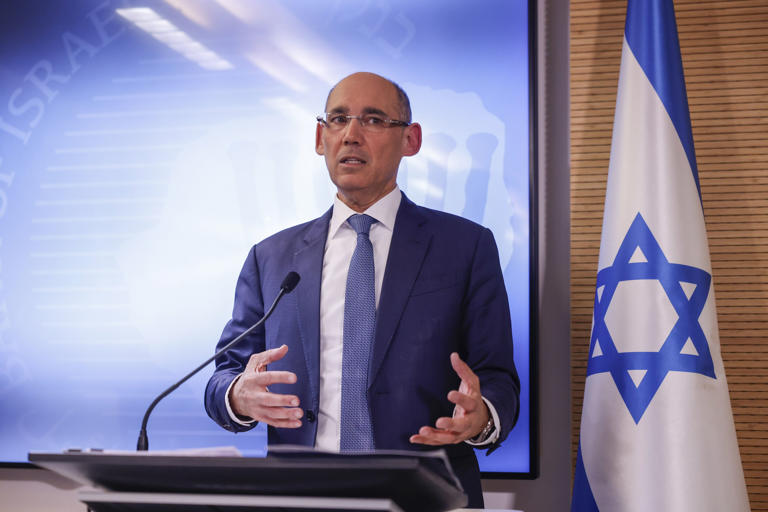
Amir Yaron© Bloomberg
(Bloomberg) -- Israel’s escalating defense spending poses risks to the economy and increases need to be carefully considered, the nation’s central bank governor said.
The war with Hamas is set to enter a seventh month, putting a strain on finances and driving up the proportion of debt to gross domestic product as the government borrows to fund the conflict. That ratio rose 1.4 percentage points to 61.9% at the end of 2023, hurting one of the country’s top strategic assets, Bank of Israel Governor Amir Yaron said.
“An assessment by markets that Israel is moving toward an increasing debt route in the medium and long term could lead to an additional increase in yields, devaluation and inflationary pressures,” Yaron said on Sunday after submitting the bank’s annual report to Prime Minister Benjamin Netanyahu.
Israel’s conflict in the Gaza Strip led to a doubling of its defense budget for 2024 and the government has already agreed to boost spending by 10 billion shekels ($2.7 billion) annually from 2025. Some argue that it needs to grow twice as much, which would put further pressure on the debt-to-GDP ratio.
Adjustments that the Israeli government has already made have a goal of stabilizing the ratio at 67% in future years.
“For markets to show tolerance toward the high temporary deficit during the war, it is important that stabilization of the debt-to GDP-ratio be the guiding principle,” Yaron said.
Related video: US new weapons transfer to Israel, moral bankruptcy not moral clarity: Bishara (Al Jazeera) View on Watch
Yaron has previously called for a special committee to form an appropriate multiyear budget plan that will take into account ramifications on the economy. Such a committee has already been announced by Netanyahu but has yet to manned or start discussions.
After receiving the report, Netanyahu said Israel needs to adapt its budget “to the needs unveiled in this war” as he again called for the country to be more self-sufficient in producing weapons.
Bloomberg
By Steven Scheer
March 31, 2024
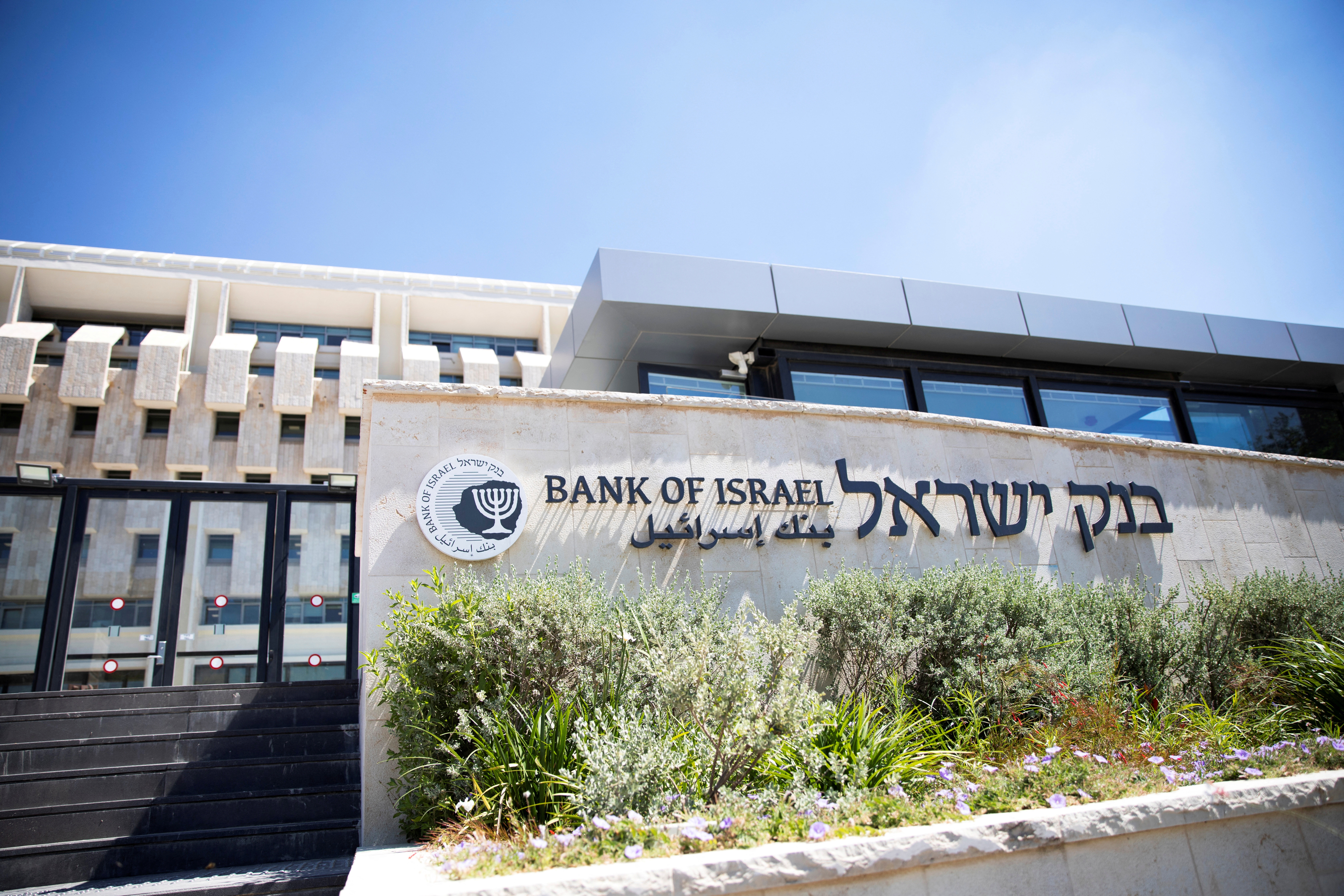
Summary

Summary
Central bank warns of economic impact of ultra-Orthodox exemptions
Ultra-Orthodox exempt from Israel's military service since 1948
More personnel needed in the army to spread economic burden
JERUSALEM, March 31 (Reuters) - The Bank of Israel on Sunday warned of economic damage if more ultra-Orthodox Jewish men do not join the country's military, weighing in on a contentious issue that has caused a rift in Prime Minister Benjamin Netanyahu's wartime government.
In its 2023 annual report, the central bank said Israel's war against Palestinian Islamist group Hamas in Gaza that began on Oct. 7 had highlighted the personnel needs of the military and has added a burden to the economy due to the sharply increased amount of service days that will be required for both conscripts and reserve soldiers.
This, it said, impairs the soldiers' economic output as well as the spouse's employment. "As the burden of military service is divided among a higher number of soldiers ... the economic impact on each of them declines, as does the aggregate impact on the economy," the Bank of Israel said.
"Expanding the circle of military personnel to include the ultra-Orthodox population....will therefore make it possible to answer the increasing defence needs while moderating the impact to personnel and to the economy."
Netanyahu's government said in February that it would seek a way to end exemptions to military service for ultra-Orthodox Jews, which date to the foundation of Israel in 1948, to spread the wartime burden across society more fairly.
But the decision met with a backlash from ultra-Orthodox Jewish parties and created a rift in the coalition.
Sunday had been the deadline for the government to come up with legislation to resolve the issue but Netanyahu filed a last-minute application to the Supreme Court for a 30-day deferment.
The Bank of Israel said that the fast growing ultra-Orthodox sector is now 7% of the economy but will be 25% in 40 years time. Only 55% of ultra-Orthodox men work and if this trend continues, Israel will lose six percentage points of gross domestic product by 2065, while the tax burden will jump.
Bank of Israel Governor Amir Yaron also said that to maintain fiscal discipline, the plan to boost annual defence spending must be met with cuts to civilian spending - although doing so also has an economist cost.
"It is important that if there is an additional increase in that budget, beyond what was already decided, it should be accompanied by fiscal adjustments that will at least prevent an enduring increase in the public debt to GDP ratio," Yaron said in a letter to cabinet ministers and parliament members.
Lawmakers this month approved an amended 2024 state budget that added tens of billions of shekels to fund the war, while Israel intends to add some 20 billion shekels ($5.4 billion) of spending towards defence a year going forward.
($1 = 3.6831 shekels)
The Reuters Daily Briefing newsletter provides all the news you need to start your day. Sign up here.
Reporting by Steven Scheer; Editing by Kirsten Donovan and Sharon Singleton
The Reuters Daily Briefing newsletter provides all the news you need to start your day. Sign up here.
Reporting by Steven Scheer; Editing by Kirsten Donovan and Sharon Singleton
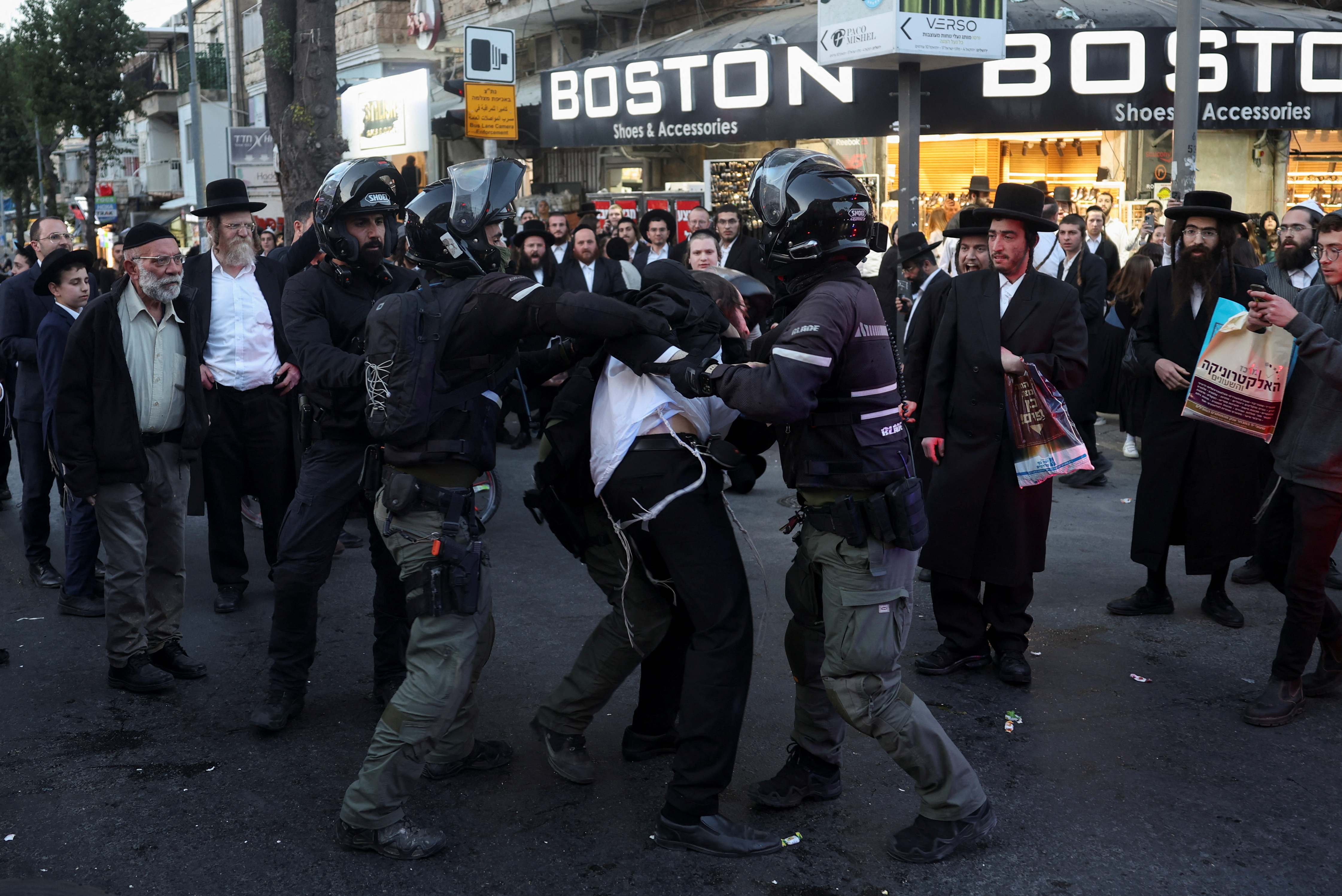
Item 1 of 6
Police officers detain an ultra-Orthodox Jewish man, as members of the 'Brothers in Arms' reservist protest group stage a demonstration in the ultra-Orthodox neighbourhood of Mea Shearim, demanding equality in Israel's military service, in Jerusalem March 31, 2024.
REUTERS/Ronen Zvulun


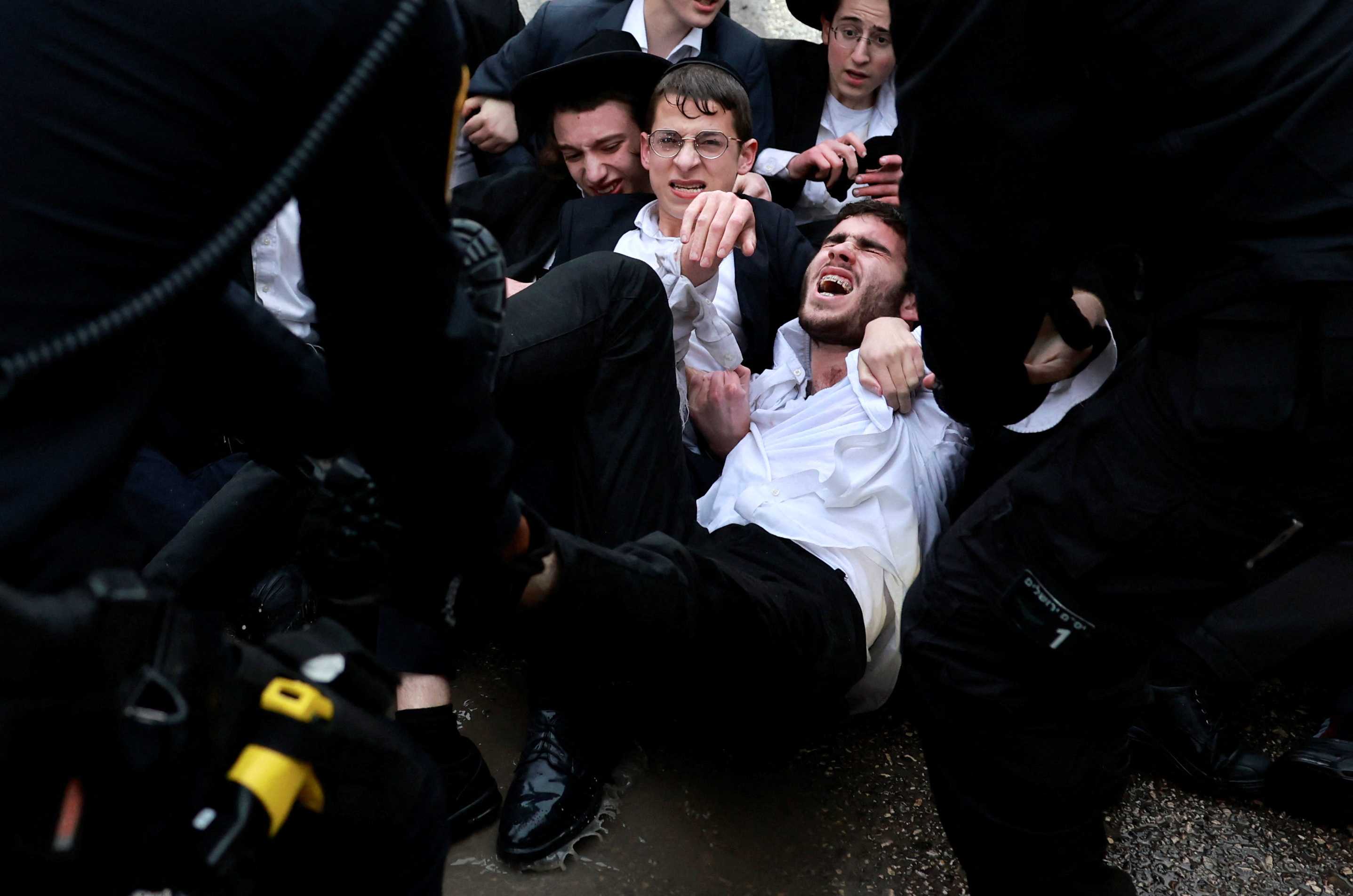

Israel’s Netanyahu eyes new law to conscript Haredi Jews
Israel’s Supreme Court gives government until Monday to present new plan for enlistment of Ultra-Orthodox Jews
Ikrame Imane Kouachi |31.03.2024 -
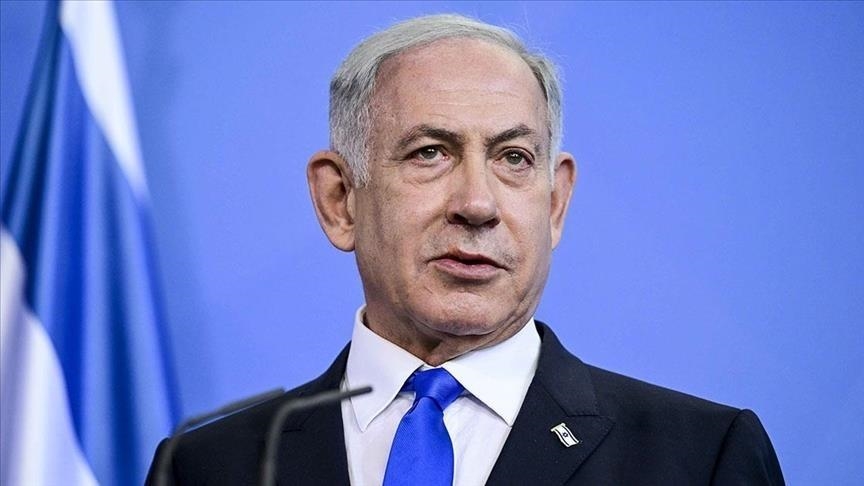
JERUSALEM
Israel Prime Minister Benjamin Netanyahu seeks to establish a ministerial committee to draft an updated enlistment law for Ultra-Orthodox Jews, according to local media on Sunday.
Israel’s Supreme Court on Thursday ordered an end to government subsidies to schools for ultra-Orthodox men eligible for army enlistment. The court gave the government until Monday to present a new plan, and until June 30 to pass it.
“Netanyahu is working with the National Security Council to form a ministerial committee to draft a conscription law to override the court ruling or at least create a feeling of some progress towards legislation,” Israeli Channel 12 said.
Netanyahu’s government includes parties supportive of Ultra-Orthodox, or Haredi, Jews such as the Shas Party, which has 11 seats in the 120-seat Knesset (Israel's parliament), and United Torah Judaism Party (seven seats).
Most Jewish men in Israel are required to serve nearly three years in the military, followed by years of reserve duty. Jewish women serve two mandatory years.
Ultra-Orthodox Jews, who make up roughly 13% of Israeli society, have traditionally received exemptions while studying full time in religious seminaries.
According to the State Attorney’s Office, there are some 63,000 enrolled Ultra-Orthodox students who will be legally subject to the draft after April 1. Some 1,500 Haredi students currently receive funding for approximately 56,500 of those students.
Israel’s ongoing war on the Gaza Strip, now in its 177th day, has ignited a debate on the enlistment of Ultra-Orthodox Jews in the military.
Israel has waged a deadly military offensive on the Gaza Strip since an Oct. 7 cross-border attack by Hamas which killed some 1,200 people.
Nearly 32,800 Palestinians have since been killed and nearly 75,300 others injured amid mass destruction and shortages of necessities. Israel has imposed a crippling blockade on the Gaza Strip, leaving its population, particularly residents of northern Gaza, on the verge of starvation.
Israel stands accused of genocide at the International Court of Justice (ICJ), which on Thursday asked Israel to do more to prevent famine in Gaza.
Israel’s Supreme Court gives government until Monday to present new plan for enlistment of Ultra-Orthodox Jews
Ikrame Imane Kouachi |31.03.2024 -

JERUSALEM
Israel Prime Minister Benjamin Netanyahu seeks to establish a ministerial committee to draft an updated enlistment law for Ultra-Orthodox Jews, according to local media on Sunday.
Israel’s Supreme Court on Thursday ordered an end to government subsidies to schools for ultra-Orthodox men eligible for army enlistment. The court gave the government until Monday to present a new plan, and until June 30 to pass it.
“Netanyahu is working with the National Security Council to form a ministerial committee to draft a conscription law to override the court ruling or at least create a feeling of some progress towards legislation,” Israeli Channel 12 said.
Netanyahu’s government includes parties supportive of Ultra-Orthodox, or Haredi, Jews such as the Shas Party, which has 11 seats in the 120-seat Knesset (Israel's parliament), and United Torah Judaism Party (seven seats).
Most Jewish men in Israel are required to serve nearly three years in the military, followed by years of reserve duty. Jewish women serve two mandatory years.
Ultra-Orthodox Jews, who make up roughly 13% of Israeli society, have traditionally received exemptions while studying full time in religious seminaries.
According to the State Attorney’s Office, there are some 63,000 enrolled Ultra-Orthodox students who will be legally subject to the draft after April 1. Some 1,500 Haredi students currently receive funding for approximately 56,500 of those students.
Israel’s ongoing war on the Gaza Strip, now in its 177th day, has ignited a debate on the enlistment of Ultra-Orthodox Jews in the military.
Israel has waged a deadly military offensive on the Gaza Strip since an Oct. 7 cross-border attack by Hamas which killed some 1,200 people.
Nearly 32,800 Palestinians have since been killed and nearly 75,300 others injured amid mass destruction and shortages of necessities. Israel has imposed a crippling blockade on the Gaza Strip, leaving its population, particularly residents of northern Gaza, on the verge of starvation.
Israel stands accused of genocide at the International Court of Justice (ICJ), which on Thursday asked Israel to do more to prevent famine in Gaza.
IDF unveils new plan to incorporate ultra-Orthodox sector in national defense mission
New military plans advises establishing a 'settlement defense authority' that will provide volunteers with training before placing them in various West Bank communities to bolster defenses instead of conscripted troops
Yossi Yehoshua|
IDF Central Command chief Major General Yehuda Fox recently proposed a plan to solve the military’s growing manpower crisis and attempt to conscript the ultra-Orthodox sector, under which they will protect settlements in the West Bank but won’t become a part of the IDF itself. In this way, other conscripted and reserve troops will be freed up for other tasks.
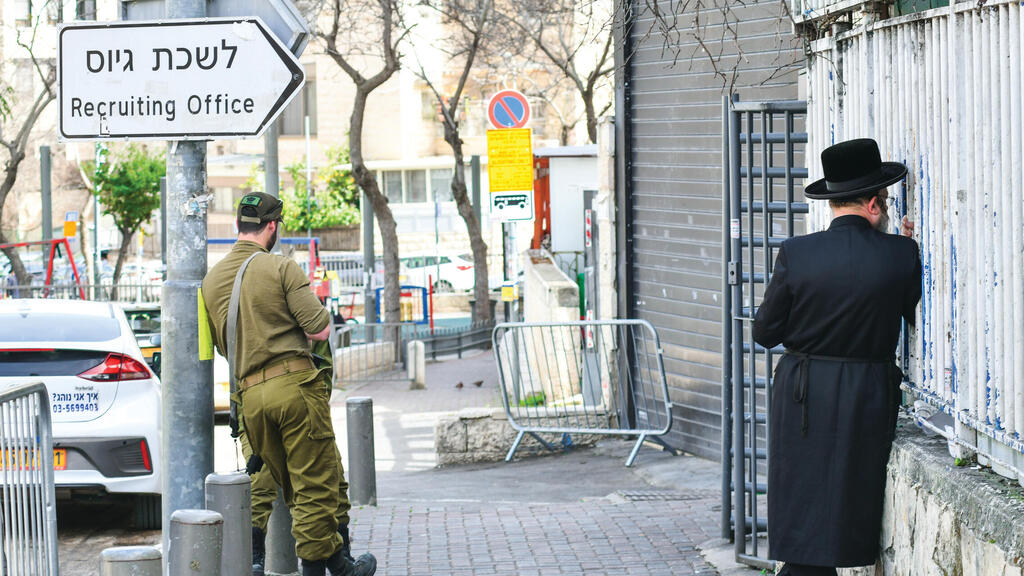
IDF soldier and ultra-Orthodox man outside IDF recruiting office
(Photo: Raffi Kotz)
Later on, this can also be done in communities close to the Gaza and northern borders. According to the plan, an authority for settlement defense will be established under the Defense Ministry, responsible for defending these communities. The authority will be staffed mainly by prospective soldiers as a replacement for military service and will provide an option for service in national security instead.
The plan stems from an understanding that settlement defense can’t remain as it was in the past and, on the other hand, a broad reserve service in all settlements will be very costly and ineffective. Currently, during the war, settlement defense is carried out by a hired security chief alongside soldiers, alert squads and military defense missions.
The smallest settlement in the IDF Central Command is manned by 16 soldiers, and the larger ones (excluding cities) by about 60 soldiers. Following the war, according to a military document, the IDF won’t be able to be involved in settlement defense to the previous level, even if it expands significantly.
The proposal stipulates the standard of defense established in a settlement must be high, providing safety and a sense of security. It should be a constant civilian factor that doesn’t divide into different brigades, that’s rooted in routine, and has good familiarity with the area and local residents.
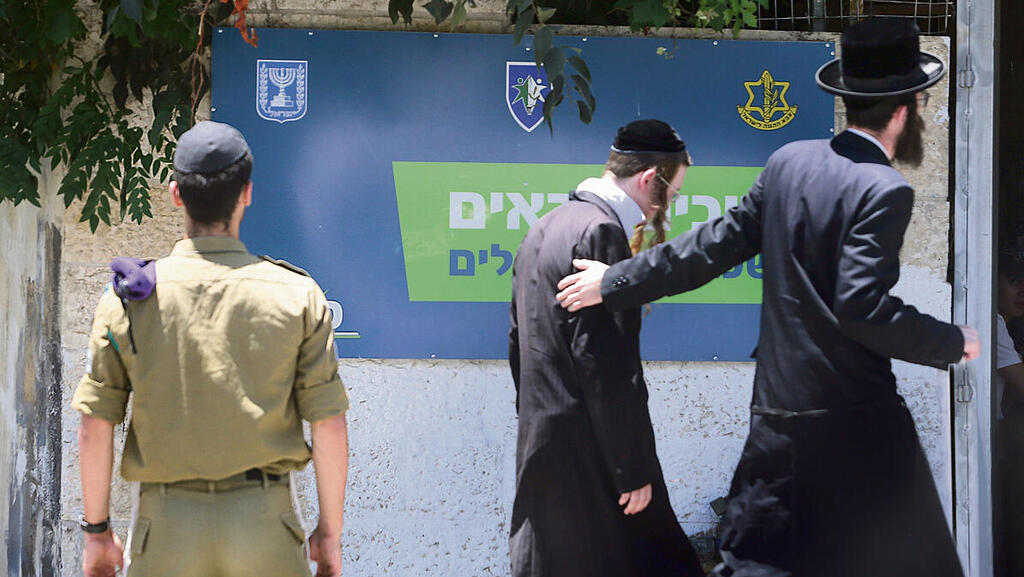
Haredi men outside recruitment office
(Photo: Alex Kolomoisky)
The proposal stipulated the standard of defense established in a settlement must be high, provide security and a sense of security, and be a permanent civil factor that does not change according to one company or another, as well as integrated into the community with familiarity with the area and local residents.
The force should not rely on local residents but can arrive at the settlement in two or three shifts per day via an organized transportation system. The settlements’ alert squads will constitute an additional defense layer for the communities, operating according to the current readiness class protocol.
According to the plan, a representative of the future settlement defense authority will be present in IDF units set to guard the settlements, who will serve as a liaison between the settlement defense forces and the IDF, under the command of a regional defense officer.
The document indicates there are 200 settlements under the IDF Central Command’s protection. Assuming an average need for 20 authority personnel per settlement, alongside command centers, logistics, and administration, the IDF Central Command will require approximately 6,500-7,000 personnel. Assuming that the IDF Southern and Northern Commands together will double the national number, the total number of required volunteers will stand at 14,000 - 15,000.
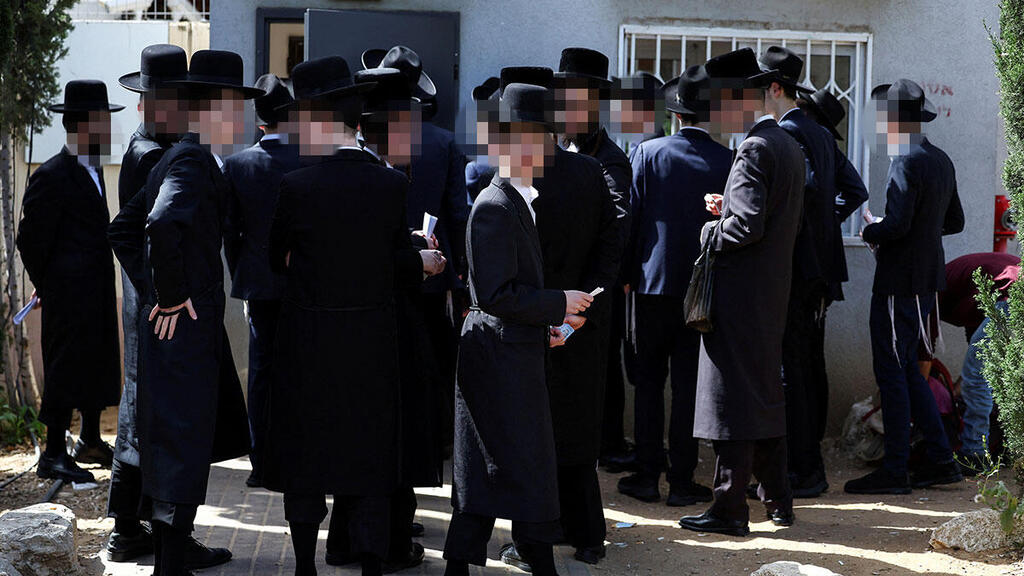
Haredi youth outside recruitment office
(Photo: REUTERS/Hannah McKay)
Service in the authority won’t be part of the IDF but part of Israel’s security establishment, and recruits won’t undergo training on IDF bases. Additionally, it will be important to define the common values to be instilled in the servicemen. A civilian security service like this could allow for ultra-Orthodox recruitment, alongside other sectors, and spread the burden of Israel’s national security.
New military plans advises establishing a 'settlement defense authority' that will provide volunteers with training before placing them in various West Bank communities to bolster defenses instead of conscripted troops
Yossi Yehoshua|
IDF Central Command chief Major General Yehuda Fox recently proposed a plan to solve the military’s growing manpower crisis and attempt to conscript the ultra-Orthodox sector, under which they will protect settlements in the West Bank but won’t become a part of the IDF itself. In this way, other conscripted and reserve troops will be freed up for other tasks.

IDF soldier and ultra-Orthodox man outside IDF recruiting office
(Photo: Raffi Kotz)
Later on, this can also be done in communities close to the Gaza and northern borders. According to the plan, an authority for settlement defense will be established under the Defense Ministry, responsible for defending these communities. The authority will be staffed mainly by prospective soldiers as a replacement for military service and will provide an option for service in national security instead.
The plan stems from an understanding that settlement defense can’t remain as it was in the past and, on the other hand, a broad reserve service in all settlements will be very costly and ineffective. Currently, during the war, settlement defense is carried out by a hired security chief alongside soldiers, alert squads and military defense missions.
The smallest settlement in the IDF Central Command is manned by 16 soldiers, and the larger ones (excluding cities) by about 60 soldiers. Following the war, according to a military document, the IDF won’t be able to be involved in settlement defense to the previous level, even if it expands significantly.
The proposal stipulates the standard of defense established in a settlement must be high, providing safety and a sense of security. It should be a constant civilian factor that doesn’t divide into different brigades, that’s rooted in routine, and has good familiarity with the area and local residents.

Haredi men outside recruitment office
(Photo: Alex Kolomoisky)
The proposal stipulated the standard of defense established in a settlement must be high, provide security and a sense of security, and be a permanent civil factor that does not change according to one company or another, as well as integrated into the community with familiarity with the area and local residents.
The force should not rely on local residents but can arrive at the settlement in two or three shifts per day via an organized transportation system. The settlements’ alert squads will constitute an additional defense layer for the communities, operating according to the current readiness class protocol.
According to the plan, a representative of the future settlement defense authority will be present in IDF units set to guard the settlements, who will serve as a liaison between the settlement defense forces and the IDF, under the command of a regional defense officer.
The document indicates there are 200 settlements under the IDF Central Command’s protection. Assuming an average need for 20 authority personnel per settlement, alongside command centers, logistics, and administration, the IDF Central Command will require approximately 6,500-7,000 personnel. Assuming that the IDF Southern and Northern Commands together will double the national number, the total number of required volunteers will stand at 14,000 - 15,000.

Haredi youth outside recruitment office
(Photo: REUTERS/Hannah McKay)
According to the proposed plan, training will be conducted at a civilian settlement defense academy in the community. The academy will operate on a civilian basis for a period determined according to a standard set by the Defense Ministry in coordination with the IDF.
The training will provide a level of competence equivalent to that of IDF combat soldiers. The authority's command and oversight may be based on former IDF commanders or even current IDF personnel who will be employed by the authority.
The training will provide a level of competence equivalent to that of IDF combat soldiers. The authority's command and oversight may be based on former IDF commanders or even current IDF personnel who will be employed by the authority.
Service in the authority won’t be part of the IDF but part of Israel’s security establishment, and recruits won’t undergo training on IDF bases. Additionally, it will be important to define the common values to be instilled in the servicemen. A civilian security service like this could allow for ultra-Orthodox recruitment, alongside other sectors, and spread the burden of Israel’s national security.
No comments:
Post a Comment